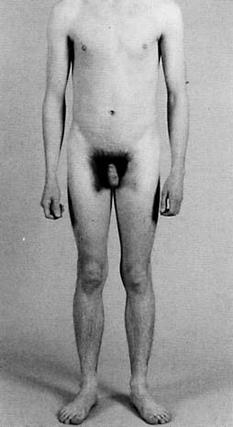Mild androgen insensitivity syndrome
Editor-In-Chief: Prab R Tumpati, MD
Obesity, Sleep & Internal medicine
Founder, WikiMD Wellnesspedia &
W8MD medical weight loss NYC and sleep center NYC
| Mild androgen insensitivity syndrome | |
|---|---|

| |
| Synonyms | MAIS |
| Pronounce | |
| Specialty | Endocrinology, Genetics |
| Symptoms | Gynecomastia, infertility, reduced body hair |
| Complications | N/A |
| Onset | Puberty |
| Duration | Lifelong |
| Types | N/A |
| Causes | Genetic mutation in the androgen receptor gene |
| Risks | |
| Diagnosis | Genetic testing, hormone level testing |
| Differential diagnosis | Partial androgen insensitivity syndrome, complete androgen insensitivity syndrome, 5-alpha-reductase deficiency |
| Prevention | |
| Treatment | Hormone replacement therapy, surgical intervention |
| Medication | |
| Prognosis | Generally good with treatment |
| Frequency | Rare |
| Deaths | |
Mild Androgen Insensitivity Syndrome (MAIS) is a condition that affects the development of the male reproductive system. This condition is a form of Androgen Insensitivity Syndrome (AIS), which is a disorder of sex development. MAIS is caused by mutations in the Androgen Receptor (AR) gene. This gene provides instructions for making a protein that allows cells to respond to androgens, which are hormones that play a key role in male sexual development. Mutations in the AR gene disrupt the normal activity of the androgen receptor, which interferes with the body's response to androgens and can lead to the signs and symptoms of MAIS.
Signs and Symptoms[edit | edit source]
The signs and symptoms of MAIS can vary widely. Some affected individuals have only mild symptoms, while others may have more severe features. Common signs and symptoms include:
- Gynecomastia (enlarged breast tissue in males)
- Infertility
- Testicular atrophy (shrinkage of the testicles)
Diagnosis[edit | edit source]
Diagnosis of MAIS typically involves a combination of physical examination, medical history, and laboratory tests. Genetic testing can confirm a diagnosis by identifying a mutation in the AR gene.
Treatment[edit | edit source]
Treatment for MAIS is typically focused on managing the symptoms. This can include hormone therapy, surgery to reduce breast size, and fertility treatments.
See Also[edit | edit source]
References[edit | edit source]
Search WikiMD
Ad.Tired of being Overweight? Try W8MD's NYC physician weight loss.
Semaglutide (Ozempic / Wegovy and Tirzepatide (Mounjaro / Zepbound) available. Call 718 946 5500.
Advertise on WikiMD
|
WikiMD's Wellness Encyclopedia |
| Let Food Be Thy Medicine Medicine Thy Food - Hippocrates |
Translate this page: - East Asian
中文,
日本,
한국어,
South Asian
हिन्दी,
தமிழ்,
తెలుగు,
Urdu,
ಕನ್ನಡ,
Southeast Asian
Indonesian,
Vietnamese,
Thai,
မြန်မာဘာသာ,
বাংলা
European
español,
Deutsch,
français,
Greek,
português do Brasil,
polski,
română,
русский,
Nederlands,
norsk,
svenska,
suomi,
Italian
Middle Eastern & African
عربى,
Turkish,
Persian,
Hebrew,
Afrikaans,
isiZulu,
Kiswahili,
Other
Bulgarian,
Hungarian,
Czech,
Swedish,
മലയാളം,
मराठी,
ਪੰਜਾਬੀ,
ગુજરાતી,
Portuguese,
Ukrainian
Medical Disclaimer: WikiMD is not a substitute for professional medical advice. The information on WikiMD is provided as an information resource only, may be incorrect, outdated or misleading, and is not to be used or relied on for any diagnostic or treatment purposes. Please consult your health care provider before making any healthcare decisions or for guidance about a specific medical condition. WikiMD expressly disclaims responsibility, and shall have no liability, for any damages, loss, injury, or liability whatsoever suffered as a result of your reliance on the information contained in this site. By visiting this site you agree to the foregoing terms and conditions, which may from time to time be changed or supplemented by WikiMD. If you do not agree to the foregoing terms and conditions, you should not enter or use this site. See full disclaimer.
Credits:Most images are courtesy of Wikimedia commons, and templates, categories Wikipedia, licensed under CC BY SA or similar.
Contributors: Prab R. Tumpati, MD



